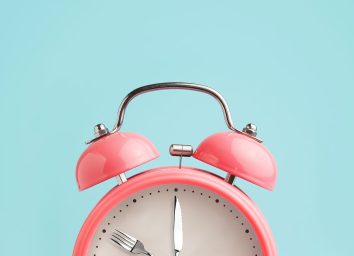10 Dangerous Side Effects of Intermittent Fasting, According to Experts

Intermittent fasting had a boom in 2020. According to a survey by the International Food Information Council, in 2020 it surpassed "clean eating" as the most popular diet, with an estimated 10% of Americans between the ages of 18-80 using it. And in 2021, intermittent fasting is still a super popular and trendy weight-loss method.
According to Audra Wilson, MS, RD, CSOWM, LDN, registered bariatric dietitian at the Northwestern Medicine Metabolic Health and Surgical Weight Loss Center at Delnor Hospital, there are two main draws of intermittent fasting (IF) for most people.
"Many people prefer black and white rules when it comes to following a diet, preferring to be told exactly what or in this case when they can eat with no gray areas. Structure is helpful for most people in life in general!" she says. "Also there are typically no constraints as to the foods that one can choose with IF, which I think is appealing to many people who feel that dieting equates to deprivation."
However, like any diet, IF can have some downsides.
"Intermittent fasting is a very restrictive way of eating and forces people to ignore hunger and fullness cues to instead eat at certain times of day," says registered dietitian Sarah Schlichter, MPH, RDN of Bucket List Tummy, and author of How to Get In Touch with Hunger and Fullness: A Guide to Intuitive Eating. "While weight loss may occur, what I see more often is people tarnishing any relationship with food that they have. They are no longer eating for pleasure, enjoyment, or hunger, but instead because the clock tells them to. When they resume their normal patterns of eating, they usually gain the weight back."
If you're thinking of trying intermittent fasting, there are some people who should definitely skip it or consult their doctor.
"Intermittent fasting is certainly not for everyone; individuals who are pregnant, have diabetes, or have struggled with disordered eating should not follow an intermittent fasting lifestyle," says Kristen Smith, MS, RDN, a registered dietitian and spokesperson for the Academy of Nutrition and Dietetics. "As with most diets and lifestyle changes, it's important to choose something you can stick with for the long-haul, intermittent fasting may be difficult for some people to follow for long periods of time."
Here are 10 possible dangerous side effects of intermittent fasting. Read on, and for more on healthy eating, don't miss Simple Ways to Start Losing Weight Immediately, According to Science.
Brain fog and other cognitive side effects.

"The brain and body have to adjust to not getting consistent fuel every 2-3 hours like a normal person would eat," says Schlichter. "This can lead to some blood sugar swings, mood changes, headaches, and even fuzzy thinking."
Feelings of frustration or failure.

"For most people it is not natural to go five or more daytime hours without eating, presenting a large challenge for those undertaking IF. Hearing from some IFers that fasting brings them clarity and focus abilities' and has resulted in great weight loss can be defeating then for those struggling with the practice," says Wilson. "Any healthy change will be just that: a change, but it should be a change that can exist within the framework of your current lifestyle. Feeling frustrated by the demanding structure of IF could lead to eating between meals followed by feelings of guilt and disappointment."
You could experience hypoglycemia.

"When you go long periods without eating or are in a fasting state, your body could experience hypoglycemia, meaning your blood sugars are at a low level. Symptoms of hypoglycemia can include shakiness, irritability, fatigue, anxiety, or irregular heartbeat," says Smith. "For individuals with diabetes this could lead to a dangerously low blood sugar level, which can have some serious side effects." For more, see What Happens To Your Body On The Intermittent Fasting Diet.
It may take away pleasure associated with food.

Becoming hyper obsessive about food takes away the pleasure associated with eating. "What if you're out for a social event and the time you're out doesn't fall within your designated time of eating? Are you supposed to just not eat while everyone around you eats? What if you feel hungry?" notes Schlichter. "Following strict rules, like those imposed in IF, can lead you to become overly obsessive about food and eating, which can act as a stressor on the body. Plus, it takes away any and all pleasure associated with eating food when there is an intense pressure or hyperfocus on it."
It may lead to overeating during eating periods.

"With all of the pent up hunger, sometimes IFers overeat during their feeding times. This is very understandable as, even though with time you may not feel hunger due to conditioning your body that cues are not an effective motivator to eat, as soon as you take that first bite the true hunger is awakened and may feel like a bottomless pit," says Wilson. "As your body tries to make up for all of the energy it has missed during fasting, you may find yourself ingesting larger portions than you have in the past. This can result in a lack of calorie deficit and lack of weight loss. Human bodies are great at storing excess energy as fat so eating just a few large meals in the day will result in weight gain over time. Not the goal of IF!" There are more things behind your overindulgence besides IF: 17 Reasons You're Overeating (And How to Stop!)
You may experience nutrient deficiencies.

"When consuming fewer meals and snacks throughout the week, it's more difficult to consume the adequate amounts of macro- and micronutrients your body needs," says Smith. "Inadequate intake of certain nutrients can lead to nutritional deficiencies, which in severe cases could lead to a variety of health problems including digestive problems, bone disease, skin disorders or neurological symptoms. Make sure to take a daily multivitamin if you are following an intermittent fasting plan." For more, see What Taking a Multivitamin Every Day Does To Your Body.
Can lead to eating disorders and disordered eating tendencies.

"Only eating between certain time windows may limit many opportunities for eating, and therefore lead to the underconsumption of food and calories. Some people may develop eating disorders or disordered eating tendencies due to the stress and hyperfocus on food and calories," says Schlichter. "Furthermore, having someone eat more just because it's 'time to eat' can lead to overeating and bingeing within the designated eating window, and ignoring all bodily cues of fullness. They may begin to view food as less important and more restructured, and may consciously or unconsciously undereat for their body's needs, leading to physical, emotional, and hormonal side effects, such as the loss of menstruation, hair loss, and dysregulated blood sugars."
Fasting can be detrimental to the health of some with underlying conditions.

"People with diabetes or those who take medications for heart conditions may find fasting to be dangerous. It is important to check with your primary care physician before moving forward with any drastic diet and lifestyle changes," says Wilson. "The IFers you follow on social media likely don't discuss this potential problem, so you have to be an informed consumer of social media and make sure it is a safe endeavor on which to embark given your personal health history."
You may experience lethargy and low energy levels.

"During the first few weeks of starting an intermittent fasting plan you may find yourself feeling sluggish and tired because your body is not getting the same amount of fuel (through food) it's used to," says Smith.
It can be hard to maintain.

"Keeping up with this strict way of eating is difficult, mainly because our bodies aren't wired to only eat within small intervals in our society today. With many social events occurring at night and often within non-designated eating times, many people are not able to stick to these restrictive guidelines for eating," says Schlichter. "Furthermore, they feel hungry throughout the day when they aren't eating and aren't able to gorge all of their calories during designated times. Once a person resumes his/her normal way of eating, they'll usually gain the weight back, but more so, have to work on rebuilding their relationship to food and learning to trust their body again to give them signs of hunger to eat, and cues for feeling fullness." To build a better relationship with food, you might consider trying these 11 Mindfulness Hacks to Eat Less, According to Experts.







